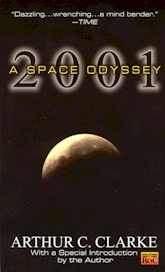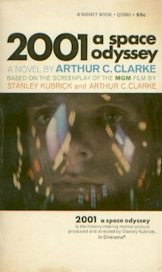
Based on a Screenplay by
Stanley Kubrick and Arthur C. Clarke
2000 Roc Book
297 pages (left)
Includes introduction by author
Signet 1968 paperback edition
221 pages (right)
plus 16 pages of movie stills

Denver Science Fiction & Fantasy Book Club |
 |
2001: A Space Odyssey (1968) Based on a Screenplay by Stanley Kubrick and Arthur C. Clarke 2000 Roc Book 297 pages (left) Includes introduction by author Signet 1968 paperback edition 221 pages (right) plus 16 pages of movie stills |
 |
| Dan | - | Amy | 7 |
 |
10 Wow! Don't miss it 8-9 Highly recommended 7 Recommended 5-6 Mild recommendation 3-4 Take your chances 1-2 Below average; skip it 0 Get out the flamethrower! U Unfinishable or unreadable - Skipped or no rating given |
| Cheri | 9 | Barb | - | ||
| Aaron | 8 | Cynthia | - | ||
| Jackie | 8 | Ron | 6 | ||
| Christine | 7 | Deb | 6 | ||
| Mike | 8 | Stephanie | 8 | ||
| Gary | 8 | Natalie | - |
|
Aaron's Commentary
Arthur C Clarke - 2001: A Space Odyssey
You could say this novel has too much exposition and too little plot, but Clarke does it with such flair that I don't mind (and the same goes for Kubrick in his classic film). Clarke's exuberance is infectious as he leaps from the last great advance in human evolution to the next. The scale is go grand that it is forgivable that Clarke doesn't slow down for characterization of individual players. (He actually wrote scenes set on Earth before the Discovery's launch to develop the characters of David Bowman and the other Discovery crewmembers. You can read them in Clarke's The Lost Worlds of 2001, and you will find that they would have added little to the novel and nothing to the film.) Clarke does a nice job of conveying the utter strangeness of meeting a more advanced race, although he could not match what Kubrick was able to achieve visually. Clarke and Kubrick's concept of hyper-advanced aliens trying to nurture emerging intelligence, which they treasure above all else, is one of the all-time great, and comforting, ideas of science fiction. What do you think? Your comments are welcome. Please send them to vanaaron@excite.com |